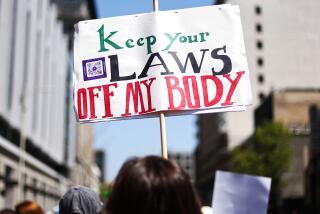Civil Disobedience Tactics of Operation Rescue Leaders
- Share via
In 1977 at a gathering of friends, I can remember clearly stating that I might some day go to jail for not paying my taxes or because of some other form of civil disobedience. There was then no avenue to act within the democratic process to alter the law decreed by the Supreme Court in Roe vs. Wade. Constitutional action was and remains, in large part, the only alternative.
I still struggle with this inclination, but Operation Rescue has certainly given like-minded people (the opportunity) to express ourselves in a meaningful manner. Operation Rescue started prior to (the Supreme Court decision in) Webster vs. Reproductive Services and has not returned full authority to the democratic process.
The morality of issues like slavery, expansionist wars, nuclear weapons, civil rights and abortion do not always lend themselves to polite parlor talk and abstract concepts like plurality. We will always have diversity of opinion, but some issues are important enough to take an unpopular stand on in order to bring about change. Civil rights in the U.S. and the end of colonialism in India were brought to a head by civil disobedience. Their leaders were not seeking jail as an end, but accepting it as a means toward the just societies they sought. The state structures did not allow for the moral right to be brought into being.
Today, pro-life people are cut off, not only by Roe vs. Wade, but also by the national media that are clearly pro-choice and refusing to express on equal terms the pro-life argument. I applaud Operation Rescue and the efforts of all within the pro-life movement. They are valiantly reopening the American mind on this most important political and moral issue.
You will not find a higher state of integrity today in any collective group than within the pro-life movement in general and Operation Rescue in particular.
REV. TOM BURDICK
Twentynine Palms


